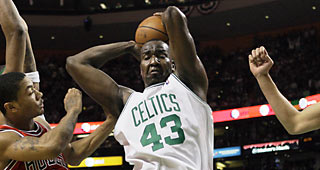As far as NBA general managers go, I confidently put Danny Ainge near the top of the list. He had the foresight to accumulate enough assets to put the Celtics in position to acquire both Kevin Garnett and Ray Allen in a single offseason, while keeping Paul Pierce and his best young players in Rajon Rondo and Kendrick Perkins. Ainge does an excellent job of balancing the all-important risk/reward relationship and also sees future chess moves well in advance. You can trust his judgment and count on him having a plan.
Because of these factors, I think I can see what Ainge sees in terms of logic and objective. But at the same time, there are very few GMs with the backbone to break up the rational title favorite at such a delicate time in the season without a reliable alternative at the position.
Ainge traded Perkins and Nate Robinson to the Oklahoma City Thunder in exchange for Jeff Green, Nenad Krstic and the Clippers' 2012 first round pick in a deal that was completely off the radar until minutes before the deadline hit like a thunderbolt.
We knew Jeff Green was a ticking time bomb for Presti and an asset he needed to convert into a legitimate big that would help balance Oklahoma City's core. Signing Green to a new deal this summer was not something the Thunder preferred considering David Falk's projected asking price and the simple fact that he was a tweener who was probably underrated in terms of true importance versus reputation but stood out as non-essential.
The importance of Perkins to Boston can be debated both ways and we don't know what that left knee looks like in the short or long-term, but he gave the Celtics an element on defense that negated the interior offense of the NBA's best bigs, most notably Dwight Howard, Andrew Bynum and Pau Gasol.
His injury in the Finals last season changed the entire dynamic and it is easy to argue Boston wins that Game 7 with him considering the way Gasol played and the way the Lakers rebounded overall in his absence.
The counter is the Celtics played very well without Perkins this season until he came back in late January and have proven to be capable of beating the Heat without him. Green is possibly the better player-for-player fit against the Heat over Perkins, as he is capable of guarding both LeBron James and Chris Bosh, but he isn't exactly a lockdown guy on that end of the floor. In fact, Green has generally been a liability on defense even if he does guard power forwards with too much size for him with far too much frequency. Green's post defense is inadequate and he is a horrible rebounder for his size.
The value of Green, however, is his general versatility and the flexibility for lineup creativity. Boston can go big with Green at small forward to slide Pierce to shooting guard, or he can go small and up-tempo with Green at power forward in a role somewhat similar to Leon Powe a few seasons ago.
Green will unquestionably be effective on the Rondo pick-and-roll and brings more athleticism to Boston's transition game, but he is an unreliable perimeter shooter and shoots far too many three-pointers considering his average (30.4% this season). He doesn't create his own offense very well at all, both off the dribble or in the post.
Maybe Green is an underrated commodity, but it seems like he has been carrying Kevin Durant's bags for four years and Russell Westbrook's for three, more than he's been held back and simply been a good solider on a team with two far better stars with clearly definable roles.
Boston must now rely heavily on a bad defender in Krstic and the O'Neal brothers, who you can't trust to stay on the parquet. The Celtics lead the league in defense at 99.9 points per 100 possessions and Kevin Garnett is far healthier now than he was this time last season, but that interior defense will take a big step backwards against the NBA's best teams without Perkins.
The Celtics also made a trade to send Semih Erden and Luke Harangody to Cleveland for a second round pick, which is presumably to clear roster space for the buyout flood.
Unless Ainge sold a lemon to Oklahoma City with Perkins' knee being in worse shape than they have led on, it is difficult to comprehend the upside in either the short or long-term. Centers of Perkins' caliber are extremely rare in today's NBA and you almost never want to trade big for small.
The consolation of picking up the first round pick in 2012 from the Clippers counts for something, but risking one of the few remaining title chances for Garnett, Pierce and Allen in this way is a gamble with far too many unintended consequences.
We'll know everything by the middle of the offseason. Boston will either win their second title in four years and if they won't it will be because they traded Perkins and if the Celtics simple qualifying offer Green into a David Lee-like stalemate, we will know they are going after Dwight Howard in 2012 with that cap space.
Grade for Celtics: C-
The Thunder acquired a defensive center slightly older than Presti's core two years ago in Tyson Chandler, but sent him back to the Hornets after his physical didn't look good and now they acquire another player with the same profile.
Assuming Perkins is healthy and is eventually re-signed this summer, this trade allows the Thunder to fully arrive as legitimate title contenders.
Last season in the first round against the Lakers, the Thunder were over-matched in the paint by Gasol and Bynum. The track record of Perkins against those two players is well-documented and he arguably has the biggest impact in this area of the game than any other player beyond Dwight Howard. The interior combination of Perkins and Serge Ibaka is going to be extremely difficult for opposing offenses to counter with anything resembling healthy offensive efficiency. Ibaka fills the Kevin Garnett role, except he is a dozen years younger (and healthier) and a better natural shotblocker.
Combining the interior defense of Perkins and Ibaka (with Nick Collison's understated production off the bench) with Westbrook and Thabo Sefolosha on the perimeter, the Thunder should become a top-10 team in points allowed per 100 possessions from their current stature at 16th.
The Thunder are already sixth offensively and trading out Green for Perkins won't change that equation adversely, and may even help increase the rate since more defensive stops and rebounds mean more Westbrook transition opportunities. Post offense was an area of need and Perkins brings far more defensively than on offense, but he can take a few possessions per game here and be effective, especially in comparison to Oklahoma City leaning on Green most heavily in this area.
Robinson is the NBA definition of a wildcard, as a feast or famine scorer. He's the type of player coaches like to throw in a game when playing from behind because he can single-handedly turn a game around, but he will ultimately be every bit the same gadget player for the Thunder as he was with the Celtics. Playing time could be even more sparse, as backup backcourt minutes are being given to Eric Maynor and James Harden now.
The main area of emphasis I sketched out for the Thunder going into the deadline period was to convert Green into a player that is a more natural complement for Westbrook and Durant in the frontcourt, and even though it isn't a superstar home run, Perkins is the type of player that facilitates deep playoff runs.
Perkins is also a player the Thunder can give a contract approaching eight-figures to annually without leaving themselves with a gigantic roster need, which would have been the problem with Green.
Grade for Thunder: A-



